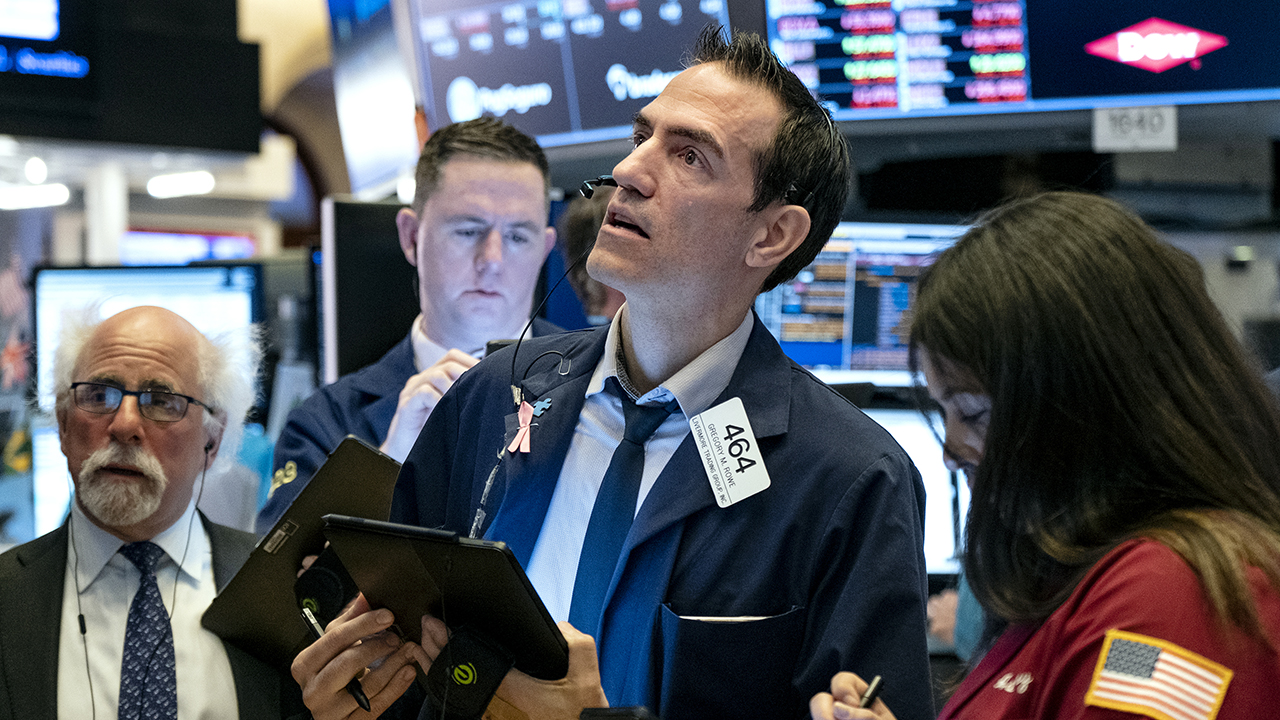Stock futures, oil drop on concerns over new Covid-19 variant
Travel stocks fall, while Treasurys rally
Fox Business Flash top headlines for November 24
Check out what's clicking on FoxBusiness.com.
Global equity markets and U.S. stock futures fell after South Africa raised the alarm over a new, fast-spreading strain of the coronavirus, triggering concern about the potential for new travel restrictions or other curbs that could limit economic activity.
With U.S. stocks set for a shortened trading session after a one-day Thanksgiving break, market participants said the global moves were likely amplified by thin trading volumes.
Stock-index futures lost ground, suggesting U.S. markets could come under pressure when they reopen. S&P 500 futures dropped 1.7%, while futures tied to the Dow Jones Industrial Average lost about 2.1%.
ASIAN STOCK MARKETS SINK AS TRADERS WATCH EUROPE VIRUS CASES

Trader Gregory Rowe, center, and others work on the floor of the New York Stock Exchange Monday, March 16, 2020. (AP Photo/Craig Ruttle)
Benchmark U.S. Treasury yields also edged lower, compared with their preholiday levels. The yield on the 10-year Treasury note dropped 0.099 percentage point to 1.545%, according to Tradeweb. Bond yields fall as prices rise.
Oil prices declined, with front-month U.S. crude-oil futures dropping 5.5% to $74.13.
South Africa’s government said Thursday it was considering new public-health restrictions to contain the new variant, dubbed B. 1.1.529. Scientists say it has a high number of mutations that may make it more transmissible and allow it to evade some of the immune responses triggered by previous infection or vaccination. The variant has been detected in a South African traveler in Hong Kong. The South African rand weakened sharply against the dollar, with $1 buying about 16.3 rand.
In Asia-Pacific, Hong Kong’s benchmark Hang Seng Index stood 2.7% lower, while Tokyo’s Nikkei 225 closed down 2.5%. Australia’s S&P/ASX 200 pulled back 1.8%.
"Everybody seems to be panicking about this new variant that is cropping up out of South Africa," said Rob Carnell, the head of research and chief economist for the Asia-Pacific region at ING.
It wasn’t yet clear if the new strain would prove to be more infectious or deadly than the Delta variant, but investors were concerned about potential travel restrictions, Mr. Carnell said, adding that in a scenario where current vaccines were ineffective, broader lockdowns might be needed.
PFIZER TO OFFER COVID-19 VACCINE FOR EUROPEAN KIDS 5-11
"There probably aren’t that many people active in markets at the moment. That’s likely to be causing bigger movements than you might otherwise have expected," he added.
Travel stocks were some of the biggest losers. Japan Airlines, rival ANA Holdings and Australia’s Qantas Airways fell between 4.5% and 6.5%. The Japanese yen, which typically strengthens in times of rising market stress, gained against the dollar.
"For now, Covid is back on the table," said Takeo Kamai, head of execution services at CLSA in Tokyo. Although Japan has no confirmed cases linked to the new variant, investors were concerned it could push back the government’s plans for a gradual reopening of the economy, Mr. Kamai said. Tokyo recently said it would allow in short-term business travelers.
Technology stocks also wilted after Bloomberg reported that China had asked Didi Global to devise a plan to delist in the U.S. The Wall Street Journal has previously reported the ride-hailing giant was considering going private, partly to placate Chinese authorities, and that regulators in China have suggested it list in Hong Kong.
CLICK HERE TO READ MORE ON FOX BUSINESS
Shares in SoftBank Group, whose Vision Fund is a major backer of Didi, fell more than 5% in Tokyo. Hong Kong-listed technology shares fell broadly, with heavyweight Tencent Holdings dropping around 3%.




















